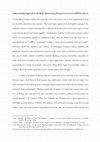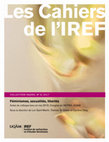Publications by Dr Polly Galis
Psychology of Women Quarterly, 2023

Postfeminism à la française, Nottingham French Studies, 2022
This paper explores three manifestoes by contemporary French sex workers, which combine personal ... more This paper explores three manifestoes by contemporary French sex workers, which combine personal memoir with theoretical and political writing: Libérez le féminisme by Morgane Merteuil (2012), Fières d’être putes by Maîtresse Nikita and Thierry Schaffauser (2007), and Porno manifesto by Ovidie (2002). I examine the complaints and demands they make of French feminists today, who frequently impede rather than support the aims of sex workers. I then outline these authors’ vision for a future feminism which could incorporate and learn from sex workers’ thought and activism, and which would be properly inclusive and radical. For these reasons, we will see why this envisaged feminism is deemed a ‘real’ feminism by some, to signify a surpassing or enhancement of earlier feminisms. Connections with a variety of feminisms will be considered, including postfeminism, sex positive feminism, and feminism in its second and fourth waves.
Modern and Contemporary France, 2022

Queer(y)ing Bodily Norms in Francophone Culture, 2021
This is the pre-review and pre-formatted version of our introduction to Queer(y)ing Bodily Norms ... more This is the pre-review and pre-formatted version of our introduction to Queer(y)ing Bodily Norms in Francophone Culture.
Queer(y)ing Bodily Norms in Francophone Culture questions how a wide selection of restrictive norms come to bear on the body, through a close analysis of a range of texts, media and genres originating from across the francophone world and spanning the twentieth and twenty-first centuries. Each essay troubles hegemonic, monolithic perceptions and portrayals of racial, class, gender, sexual and/or national identity, rethinking bodily norms as portrayed in literature, film, theatre and digital media specifically from a queer and querying perspective. The volume thus takes «queer(y)ing» as its guiding methodology, an approach to culture and society which examines, questions and challenges normativity in all of its guises. The term «queer(y)ing» retains the celebratory tone of the term «queer» but avoids appropriating the identity of the LGBTQ+ community, a group which remains marginalized to this day. The publication reveals that evaluating the bodily norms depicted in francophone culture through a queer and querying lens allows us to fragment often oppressive and restrictive norms, and ultimately transform them.
Challenging Normative Spaces and Gazes: The Body in 20th- and 21st-Century Francophone Culture, L'Esprit Créateur, 2020
This special issue traces representations of the body in twentieth and twenty-first century liter... more This special issue traces representations of the body in twentieth and twenty-first century literature and visual culture from across the francophone world. The volume explores the ways in which bodies in all their forms can be deployed to challenge normative spaces and gazes across a range of geographical and cultural contexts. This introduction highlights contemporary responses to societal attempts to assert power over various bodies. It offers a conceptual overview of corporeality, discussing how thinkers and philosophers have viewed interactions between different bodies and their surrounding spaces. Finally, the introduction presents the essays, drawing out their connections to power and representation.
Women in French Studies, 2019
This article examines Poser nue (2011), a critical commentary about the female nude by Nancy Hust... more This article examines Poser nue (2011), a critical commentary about the female nude by Nancy Huston alongside sketches of male nudes, couples, flowers and assorted body parts by her partner Guy Oberson. The article first examines Huston's presentation of nude models' and sex-workers' experience of nudity, which offers an intersectional study of modeling and victimization, and emphasizes the importance of mind and body as well as gender difference when it comes to desire and artistic creation. The essay ends with Oberson's more fluid portrayals of people and plants, and concludes that this clash of sorts between words and images is ultimately a lesson in love and art—that difference should be treasured as well as renegotiated.
Sexual/Textual Boundaries: Recent Women’s Writing in French, L'Esprit Créateur, 2019
This article establishes how hyper-conformity to dominant sexual discourses constitutes a form of... more This article establishes how hyper-conformity to dominant sexual discourses constitutes a form of feminist counter-narrative in Nelly Arcan’s À ciel ouvert. It argues that hyper-conformity in this novel enables Arcan to articulate seemingly incompatible undertakings: to fatalistically accept contemporary women’s condition (depicted as male-orientated and oppressive), along with the hegemonic powers of sex and beauty industries, and to delegitimise these through playful narration and hyperbolic pastiche. In the scope of this special issue on sexual/textual boundaries in twenty-first-century women’s writing in French, this article contends that Arcan reflects social boundaries faced by women, and the difficulty of overstepping them.
L’Esprit créateur, 2018
Huston's corpus is commonly characterised by its transnational and multi-generic format, and Carn... more Huston's corpus is commonly characterised by its transnational and multi-generic format, and Carnets de l'incarnation is no exception. Huston draws inspiration from multiple contexts including a research trip to Israel, a gallery in Beijing, a New York book-club, and the Parisian Hebdo polemic surrounding the 2015 terrorist attacks. She also incorporates both public pieces (newspaper articles, critical prefaces, conference proceedings) and personal fragments (diary entries, poetry, and prose), playing with narrative style and shifting from the comic to the tragic.

Galis, Polly, ‘"Bon Sexe, Mauvais Sexe": La Représentation Porno-Érotique dans Infrarouge de Nancy Huston’, in Féminismes, Sexualités, Libertés, ed. by Lori Saint-Martin, Thérèse St-Gelais and Caroline Désy, no. 8 (Montréal: Cahiers de l’IREF (Collection Agora), 2017), 39-48. L'analyse de discours que propose Élisabeth Mercier dans la foulée de la SlutWalk, manifestation ... more L'analyse de discours que propose Élisabeth Mercier dans la foulée de la SlutWalk, manifestation féministe contre les stéréotypes qui banalisent et justifient le viol, illustre parfaitement l'imbrication des rapports de pouvoir et d'oppression dont parle Wendy Delorme. Alors que certaines femmes ont trouvé libérateur le fait de refuser la honte en revalorisant le terme de « slut » et en revêtant des tenues normalement considérées comme provocantes, les critiques de ces manifestations y voient plutôt une reconduction des normes de beauté patriarcales et l'illustration d'un privilège aux effets d'exclusion racistes et classistes. La liberté sexuelle, de parole ou de rassemblement n'est donc pas la même pour toutes.

Nancy Huston has previously claimed that her lack of any clear-cut national identity or of any st... more Nancy Huston has previously claimed that her lack of any clear-cut national identity or of any strong affiliation to her original cultural heritage, enables her to take on multiple identities within her literature. Huston’s claim, however, can be deemed problematic if it presupposes a right to speak on the behalf of minority or ‘subaltern’ figures. This is particularly problematic in view of Huston’s position as a white middle-class writer. In other words, the representation of others in literature can entail imperial repercussions. We will begin this chapter by postulating that literature can constitute a means of representing ourselves as other, or others tout-court (in keeping with Huston’s transnational approach to(self-)representation), before turning to the work of Gayatri Spivak to illustrate how literary representations of others can betray a neo-colonial or imperial character. We will then establish the ways in which Huston avoids an imperial representation of others in The Goldberg Variations and Slow Emergencies by speaking to rather than for others. We will also explore how this process is underpinned by an intersectional reading of otherness, in keeping with the critical work of Kimberlé Crenshaw and Elisabeth Spelman, and reminiscent of Gilles Deleuze and Félix Guattari’s concept of ‘becoming-minoritarian’ and Rosi Braidotti’s of ‘becoming-woman’ which, in the case of Huston’s literature, are key to distinguishing between minority and ‘subaltern’ figures. In both cases, we will demonstrate how Huston speaks to not for others in both of the studied novels, and how, in so doing, she challenges monolithic and binary categories of being.
Conference Organisation by Dr Polly Galis
Paris-based activist committed to supporting the most vulnerable of QTIPOC subjects (Queer, Trans... more Paris-based activist committed to supporting the most vulnerable of QTIPOC subjects (Queer, Transgender and Intersex People of Colour).
University of Birmingham, 19-20th January 2018
Symposium Organisation (CFPs) by Dr Polly Galis
Co-organised by Pooja Booluck (British Columbia), Françoise Campbell (IMLR), Polly Galis (Bristol... more Co-organised by Pooja Booluck (British Columbia), Françoise Campbell (IMLR), Polly Galis (Bristol), Beth Kearney (Queensland) and Eric Wistrom (Wisconsin-Madison)
Women in French invites papers for a virtual international symposium focusing on immersion in women's literature and hybrid media (including photo-texts, bande dessinée, theatre, spoken word, blogging, other internet-based media, etc.), with a focus on immersivity as both a pleasurable and productive feature. This online event welcomes presentations from postgraduate students and early career researchers working on questions of gender or feminism in French studies.











Uploads
Publications by Dr Polly Galis
Queer(y)ing Bodily Norms in Francophone Culture questions how a wide selection of restrictive norms come to bear on the body, through a close analysis of a range of texts, media and genres originating from across the francophone world and spanning the twentieth and twenty-first centuries. Each essay troubles hegemonic, monolithic perceptions and portrayals of racial, class, gender, sexual and/or national identity, rethinking bodily norms as portrayed in literature, film, theatre and digital media specifically from a queer and querying perspective. The volume thus takes «queer(y)ing» as its guiding methodology, an approach to culture and society which examines, questions and challenges normativity in all of its guises. The term «queer(y)ing» retains the celebratory tone of the term «queer» but avoids appropriating the identity of the LGBTQ+ community, a group which remains marginalized to this day. The publication reveals that evaluating the bodily norms depicted in francophone culture through a queer and querying lens allows us to fragment often oppressive and restrictive norms, and ultimately transform them.
Conference Organisation by Dr Polly Galis
Symposium Organisation (CFPs) by Dr Polly Galis
Women in French invites papers for a virtual international symposium focusing on immersion in women's literature and hybrid media (including photo-texts, bande dessinée, theatre, spoken word, blogging, other internet-based media, etc.), with a focus on immersivity as both a pleasurable and productive feature. This online event welcomes presentations from postgraduate students and early career researchers working on questions of gender or feminism in French studies.
Queer(y)ing Bodily Norms in Francophone Culture questions how a wide selection of restrictive norms come to bear on the body, through a close analysis of a range of texts, media and genres originating from across the francophone world and spanning the twentieth and twenty-first centuries. Each essay troubles hegemonic, monolithic perceptions and portrayals of racial, class, gender, sexual and/or national identity, rethinking bodily norms as portrayed in literature, film, theatre and digital media specifically from a queer and querying perspective. The volume thus takes «queer(y)ing» as its guiding methodology, an approach to culture and society which examines, questions and challenges normativity in all of its guises. The term «queer(y)ing» retains the celebratory tone of the term «queer» but avoids appropriating the identity of the LGBTQ+ community, a group which remains marginalized to this day. The publication reveals that evaluating the bodily norms depicted in francophone culture through a queer and querying lens allows us to fragment often oppressive and restrictive norms, and ultimately transform them.
Women in French invites papers for a virtual international symposium focusing on immersion in women's literature and hybrid media (including photo-texts, bande dessinée, theatre, spoken word, blogging, other internet-based media, etc.), with a focus on immersivity as both a pleasurable and productive feature. This online event welcomes presentations from postgraduate students and early career researchers working on questions of gender or feminism in French studies.